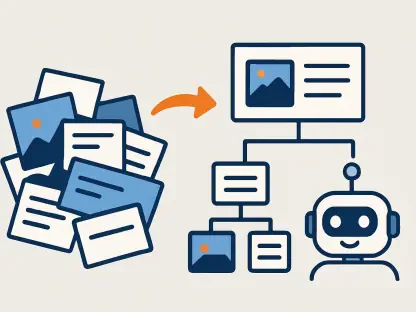In a region as dynamic and diverse as Latin America, the rapid rise of digital payments has brought both incredible opportunities and significant challenges to the forefront of economic transformation. As millions of consumers and businesses transition to online and mobile transactions, the specter of data breaches and fraud looms large, threatening to undermine trust in these emerging systems. Tokenization, a cutting-edge technology that replaces sensitive financial information with unique digital identifiers, emerges as a powerful solution to this pressing issue. By rendering intercepted data useless to cybercriminals, it offers a shield against the vulnerabilities inherent in digital exchanges. This innovation is not merely a technical fix but a cornerstone for building a secure and inclusive financial ecosystem across the region, where digital adoption is accelerating at an unprecedented pace. As Latin America navigates this digital frontier, understanding the role of tokenization becomes essential for stakeholders aiming to protect users and foster confidence in modern payment methods.
Understanding Tokenization
Decoding the Technology Behind Secure Transactions
Tokenization stands as a pivotal advancement in the realm of digital payment security, particularly for a region like Latin America where online transactions are becoming the norm. At its core, this technology replaces sensitive data—such as credit card numbers or bank account details—with unique digital tokens that are specific to a single transaction. These tokens hold no intrinsic value outside their intended use, meaning that even if they are intercepted by malicious actors, they cannot be exploited for fraudulent purposes. This process operates invisibly to the end user, taking mere milliseconds to execute, ensuring that security does not come at the cost of convenience. For Latin America, where cyber threats are a growing concern amid rapid digital growth, tokenization provides a robust defense mechanism that safeguards personal and financial information without disrupting the seamless experience users expect from modern payment platforms.
The significance of tokenization extends beyond its technical functionality to address broader vulnerabilities in the digital payment landscape. Unlike traditional methods that store or transmit raw data, tokenization ensures that sensitive information is never exposed during a transaction, whether it occurs online, in-store, or via a mobile device. This is particularly critical in markets where cybersecurity infrastructure may still be developing, and the risk of data breaches remains high. By creating a barrier between actual financial details and the transaction process, tokenization minimizes the potential impact of hacking attempts, making it a vital tool for protecting both consumers and businesses. As digital wallets and contactless payments gain traction across Latin America, the adoption of such technology becomes not just beneficial but necessary to maintain the integrity of an evolving financial ecosystem that prioritizes user safety above all else.
Addressing Regional Security Challenges
Tokenization’s relevance in Latin America is amplified by the region’s unique security challenges, where the surge in digital transactions often outpaces the development of robust cybersecurity measures. Many countries in the region face high rates of cybercrime, with fraudsters targeting vulnerabilities in payment systems to steal sensitive data. Tokenization counters this threat by ensuring that no usable information is available for theft, as the tokens generated are temporary and context-specific. This approach is especially impactful in areas where trust in digital platforms remains fragile due to past incidents of data leaks or fraud. By mitigating these risks, tokenization helps create a safer environment for users who might otherwise hesitate to engage with online banking or e-commerce, thereby supporting the broader adoption of digital financial tools.
Moreover, the technology serves as a bridge between emerging digital economies and established security standards, offering a scalable solution that can adapt to varying levels of technological maturity across Latin America. For instance, in urban centers with advanced payment infrastructures, tokenization enhances existing systems by adding an extra layer of protection. In contrast, in rural or underserved areas where digital payments are just taking root, it provides a foundational security measure that encourages participation without fear of exploitation. The flexibility of tokenization to cater to diverse environments makes it a unifying force in the region’s fragmented payment landscape. As cyber threats continue to evolve, embracing such innovative solutions becomes imperative for sustaining growth and confidence in digital transactions throughout Latin America.
Benefits for Latin America’s Digital Economy
Building Confidence Among Users and Businesses
One of the most profound impacts of tokenization in Latin America lies in its ability to foster trust among consumers who remain skeptical about the safety of digital payments. In a region where security concerns often deter individuals from adopting online banking or mobile wallets, the assurance that personal and financial data is protected through unique, temporary tokens can be a game-changer. This technology alleviates fears of identity theft and unauthorized transactions, encouraging more people to embrace digital payment methods for everyday purchases. The ripple effect is significant, as increased consumer confidence translates into higher transaction volumes, driving economic activity and supporting the shift toward a cashless society in markets where cash has long been dominant.
For businesses and financial institutions, tokenization offers equally compelling advantages by reducing the operational risks associated with handling sensitive customer data. A data breach can result in substantial financial losses and reputational damage, but with tokenization, the likelihood of such incidents diminishes significantly since no exploitable information is stored or transmitted. Additionally, this technology aids compliance with stringent data protection regulations that are becoming more common across the region, helping companies avoid penalties and build credibility with their clientele. By integrating tokenization into their systems, businesses not only protect themselves but also position themselves as trustworthy partners in the eyes of consumers, creating a virtuous cycle of security and reliability that benefits the entire digital economy of Latin America.
Empowering Financial Inclusion
Tokenization plays a crucial role in advancing financial inclusion, a pressing priority for Latin America where large segments of the population remain unbanked or underbanked. In countries like Mexico, where cash transactions still dominate despite the rise of digital alternatives, the fear of fraud often discourages small businesses and individuals from participating in the digital marketplace. Tokenization addresses this barrier by providing a secure framework that allows even those with limited technological resources to engage in online commerce without risking their financial safety. This opens up new avenues for economic participation, enabling micro-entrepreneurs and rural communities to access broader markets and financial services that were previously out of reach due to security concerns.
Beyond individual empowerment, the broader implications of tokenization for financial inclusion touch on systemic economic growth across the region. By creating a safer digital payment environment, this technology supports initiatives aimed at integrating underserved populations into formal financial systems, such as government programs for digital subsidies or remittances. It also encourages partnerships between fintech companies and local organizations to develop accessible payment solutions tailored to unique community needs. As more people gain confidence in using digital tools without fear of data theft, the digital divide narrows, fostering greater economic equity. Tokenization, therefore, acts as a catalyst for connecting disparate segments of society to the benefits of a modern economy, ensuring that progress in digital payments leaves no one behind in Latin America.
Market Trends and Growth
Surging Demand and Future Projections
The tokenization market in Latin America is experiencing remarkable growth, reflecting the region’s increasing reliance on secure digital payment solutions. Current projections indicate a compound annual growth rate (CAGR) of 22.7% from now through 2030, with the market expected to reach a value of USD 1.63 billion by the end of this period. This upward trajectory underscores the technology’s critical role in addressing security demands as digital transactions become ubiquitous. In 2024, Latin America already contributed over 5% of global tokenization revenue, amounting to USD 125.71 million, signaling a strong foundation for further expansion. These figures highlight not only the technology’s relevance but also the region’s readiness to embrace innovations that safeguard financial interactions in an increasingly connected world.
This rapid adoption is driven by several factors, including the proliferation of contactless and mobile payments that require robust security measures to maintain user trust. Governments and private sectors alike are recognizing the importance of tokenization in protecting national payment infrastructures against escalating cyber threats. The technology’s ability to integrate seamlessly with existing systems further accelerates its uptake, as businesses seek cost-effective ways to enhance security without overhauling their operations. As digital transformation continues to reshape financial interactions across Latin America, tokenization stands poised to redefine the standards of payment safety, ensuring that growth in transaction volumes is matched by equally strong protective mechanisms that benefit all stakeholders.
Supporting the Shift to Modern Payment Methods
The shift toward modern payment methods such as contactless cards and mobile wallets is reshaping financial behaviors across Latin America, and tokenization is at the heart of this transition. These payment innovations prioritize speed and convenience, but they also introduce new vulnerabilities that cybercriminals are quick to exploit. Tokenization mitigates these risks by ensuring that transactions across various platforms remain secure, whether they occur in a physical store or through an app. This adaptability is crucial in a region where consumer preferences vary widely, from urban tech-savvy users to rural populations just beginning to explore digital options. By providing a consistent layer of protection, tokenization supports the widespread acceptance of these modern payment tools without compromising safety.
Furthermore, the technology’s role in enabling cross-border transactions adds another dimension to its importance in Latin America’s payment evolution. As regional trade and e-commerce grow, the need for secure international payments becomes more pronounced, especially in markets with differing regulatory frameworks. Tokenization offers a standardized approach to security that transcends borders, facilitating smoother interactions between merchants and consumers across countries. This capability not only boosts economic integration but also positions Latin America as a competitive player in the global digital economy. With tokenization paving the way, the region can confidently expand its adoption of cutting-edge payment methods, knowing that the underlying security infrastructure is robust enough to handle the complexities of a connected marketplace.
Key Players and Innovations
Leadership in Payment Security Solutions
Among the key players driving the adoption of tokenization in Latin America, companies with deep regional expertise stand out for their contributions to secure payment ecosystems. Operating across markets like Mexico, Puerto Rico, and Colombia, these firms integrate tokenization into their offerings to address the specific security needs of each locale. Their solutions are designed to protect transactions at every touchpoint, from point-of-sale systems to online platforms, ensuring comprehensive coverage against fraud. Leveraging a combination of local market knowledge and advanced technological capabilities, such companies deliver tailored approaches that resonate with the diverse economic and cultural contexts of the region, making tokenization both accessible and effective for a wide range of users and businesses.
The impact of these efforts is evident in the growing trust placed in digital payment systems by Latin American consumers and merchants alike. By prioritizing innovation in security, these industry leaders help set benchmarks for reliability that others in the sector strive to meet. Their work often involves close collaboration with financial institutions and regulatory bodies to ensure that tokenization solutions align with regional compliance standards while pushing the boundaries of what’s possible in payment technology. This dual focus on practicality and progress is vital for sustaining momentum in digital transformation, as it reassures stakeholders that security will keep pace with the rapid evolution of financial services across Latin America, fostering an environment where innovation thrives alongside safety.
Catering to Diverse Stakeholder Needs
Tokenization serves as a unifying solution that addresses the varied needs of all participants in Latin America’s payment ecosystem, from individual consumers to large financial institutions. For everyday users, the technology offers a straightforward benefit: the peace of mind that comes with knowing their financial data is secure during every transaction, whether they’re shopping online or tapping to pay at a local store. This sense of safety is crucial for encouraging broader adoption of digital payments, especially among those who have been hesitant due to past experiences with fraud or skepticism about technology. By simplifying security without requiring technical know-how from users, tokenization ensures that everyone can participate in the digital economy with confidence.
Merchants and financial entities, on the other hand, find value in tokenization’s ability to streamline operations while minimizing risk. For businesses, particularly small and medium-sized enterprises, the technology reduces the burden of safeguarding customer data, allowing them to focus on growth rather than potential liabilities. Meanwhile, banks and payment processors benefit from enhanced compliance with data protection laws and reduced exposure to breaches that could erode customer trust. This alignment of interests creates a cohesive framework where security enhancements driven by tokenization benefit the entire payment chain. Reflecting the economic and cultural nuances of Latin America, this technology adapts to local realities, ensuring that solutions are not only effective but also relevant to the unique challenges faced by different stakeholders in the region.
Reflecting on a Safer Digital Future
Looking back, the journey of tokenization in Latin America reveals a powerful narrative of resilience and innovation in the face of escalating cyber threats. It tackles the critical issue of data security by transforming sensitive information into unusable tokens, effectively curbing fraud and breaches that once plagued digital transactions. This technology not only fortifies trust among cautious consumers but also empowers businesses and financial institutions to operate with greater assurance in a vulnerable digital landscape. The contributions of industry leaders, alongside impressive market growth, underscore tokenization’s pivotal role in shaping a robust payment ecosystem. Moving forward, stakeholders should prioritize continued collaboration to refine and expand these security measures, ensuring they evolve with emerging threats. Investing in education about digital safety and advocating for supportive regulatory frameworks will further solidify the foundation for a secure, inclusive financial future in the region.









